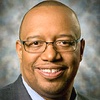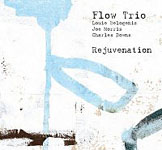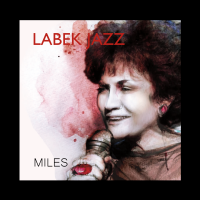Home » Jazz Articles » Interview » Ken Field & The Revolutionary Snake Ensemble: The Musica...
Ken Field & The Revolutionary Snake Ensemble: The Musical Road Less Taken
Being in the city where this music that has had such an influence on the band and on me is awe inspiring.
 Saxophonist/composer Ken Field describes the Revolutionary Snake Ensemble as a "funk and street beat brass band playing New Orleans and other modern improvised celebratory styles." Playing original compositions and those of artists as diverse as Billy Idol and Ornette Coleman, the RSE was formed in 1990 to entertain a at a pagan women's ritual celebration. The project continued and today RSE is a fixture on the Boston, New York and New Orleans musical scenes. RSE's two discs—Year of the Snake (Innova, 2003) and Forked Tongue (Cuneiform, 2008)—have each received great reviews.
Saxophonist/composer Ken Field describes the Revolutionary Snake Ensemble as a "funk and street beat brass band playing New Orleans and other modern improvised celebratory styles." Playing original compositions and those of artists as diverse as Billy Idol and Ornette Coleman, the RSE was formed in 1990 to entertain a at a pagan women's ritual celebration. The project continued and today RSE is a fixture on the Boston, New York and New Orleans musical scenes. RSE's two discs—Year of the Snake (Innova, 2003) and Forked Tongue (Cuneiform, 2008)—have each received great reviews.
When the poet Robert Frost penned "The Road Not Taken" he obviously didn't know about Ken Field and the Revolutionary Snake Ensemble. However, somehow the concept of taking the road less traveled accurately describes the musical path blazed by this horn and percussion group hailing from Massachusetts. It defies logic that a band with its home base in Cambridge, Massachusetts can somehow have its musical roots firmly planted in the deep, dark, delta soil of the New Orleans brass band tradition, but Field and the Revolutionary Snake Ensemble have managed to do just that.
Since it's founding in 1990, the RSE has charmed audiences with a musical tapestry as colorful and diverse as any other out there. With covers ranging from Sun Ra to Billy Idol and original compositions covering almost every genre in between, it's a challenge to identify a single influence. In fact, it's next to impossible. When asked: "how do you explain how a group from Cambridge got into the New Orleans brass band tradition," the answer shows just how far RSE has traveled musically.
"You know we started out with a slightly different musical thrust," Field recalled recently. "We were doing percussion and horns in more of a tribal kind of thing. Some of us had played in an African, Senegalese group; of course, same question could apply. None of us are African as it were, but you know, that's how we started; kind of doing just grooves and jams and flutes and it was very well received. It was just kind of a party thing or a jam thing, very informal and people liked it. So we got hired to do gigs."
The music produced by New Orleans brass bands is special for a number of reasons. It is music of celebration and it is music that that the band brings to the party, rather than the party coming to the band. Further, the instrumentation is different. Without a piano or guitar, chords are constructed from the horn melodies played and the resulting ability to spontaneously build chords and improvise is at the core of brass band music. Add to this Field's travels to the Crescent City and it's easy to see why RSE found it's musical soul in the street sounds of New Orleans' brass bands.
Says Field, "I think the instrumentation in a way led us to the New Orleans, brass band sound. The fact that what we had in common in some ways was the mobile nature of the group...it was almost obvious that this group should be doing this kind of material. Another thing is I personally just have an affinity for some of the rhythms that are prominent in some of that brass band music—you know the straight eighth-note kind of rhythm in Cuban and Haitian music...It just clicked."
With its ever-changing instrumentation (usually averaging seven-to-eight members—two drummers, one or two bassists, and four horns—the ensemble's lineup and size shifts over time and for specific events), the diversity of musical experience within RSE supports creativity and experimentation within the tradition. At various times, RSE members have performed with artists as diverse as DJ Logic, Anthony Braxton and G-Love & Special Sauce.
That diversity also manifests itself in the music performed by RSE. The group's first CD, Year of the Snake included music by Field, Sun Ra, John Scofield and James Brown. The second, and more widely distributed release, Forked Tongue, contained a cover of Billy Idol's "White Wedding," (first performed for a wedding involving a bride named White), as well as the traditional New Orleans dirge" Just a Closer Walk." That breadth of musical range creates a fresh, enjoyable sound that has appeal across genres. In fact, Field describes the band as "three points of a triangle"—New Orleans brass band music, funk and free jazz —and the ensemble manages to find the common thread in these very dissimilar musical styles. Spontaneity is also an important part of their music.
"Much of what we do is very spontaneous," says Field, "both through my own direction in the studio or on the stage, but also through individual choices that anybody makes. For variety in the sound the individual choices that the individual musicians make are so important. We don't have full-out arrangements written up that we abide by every time we play. For a four-horn group, that maybe a little unusual, but we come up with structures spontaneously. There's a great aspect to spontaneity and to the energy you get from seeing or trying a tune for the first time that you never get again; you're taking some risks by doing that, but if you don't take some risks, you don't get the benefits."
While the RSE has recorded two discs, there's certainly the impression that it's live where this group shines. Just like the brass bands of New Orleans that provide RSE with much of its inspiration, live performances provide a fuel that cannot be easily recreated in a recording session. And as Mardi Gras approaches in the Crescent City, the RSE prepares to embark on what has become an annual pilgrimage and perhaps the ultimate live performance for a group that feels a connection to New Orleans. The group takes the train down and performs along the way, culminating in a march in one of the city's premiere parades, the Krewe of Muses.
"Being in the city where this music that has had such an influence on the band and on me is awe inspiring," Field says, "and, of course, being hired to come down and march in one of the parades—you know there's plenty of unbelievably great brass bands down there—so we're ridiculously honored that that is the case. One year we played a benefit for the New Orleans Musician's Clinic and we were playing out in the street in front of the place and people just assumed we were a New Orleans band. That's an extreme compliment."

But what started as a unique gig, became much more after hurricane Katrina devastated the city in August 2005. The months following the storm's landfall and the flooding that followed were difficult times for both residents and those who loved the "city that care forgot." As governments quarreled and bickered, residents looked for any opportunity to feel normal again. Mardi Gras 2006 seemed to provide the first opportunity for healing, yet the event that in many ways brings the city together each year was itself a source of division. Many felt it was too soon to throw a party, while others felt it was the right thing to do to promote a return to normalcy. Field struggled with those very emotions as RSE debated a return.
"After Katrina, we really wondered: 'is it appropriate for us to go down there; even though we were invited, are we helping or hurting?' You know, does this really matter? All of our friends, everyone we talked to said, 'Yes, I'd wish you'd come down.' It's kind of like people visiting you when you're in the hospital, just being there matters and that's how we felt. We felt that just being thing was a positive thing. The way people celebrated that very first Mardi Gras after Katrina, was very much like a New Orleans funeral. There were months and months of hard work and sickness in terms of the physical nature of people and the city itself. And then it was time to celebrate life. Celebrating life is the message and we were very honored to be part of that celebration."
The word celebration provides an appropriate description of the Revolutionary Snake Ensemble's musical mission. Less concerned with categories and more concerned with making good music and having fun, RSE provides something for every listener. To find a large group capable of creating something new, while staying true to the traditions of their influences is rare indeed.
With an eye on greater exposure through movies, television and even more importantly touring, Ken Field and the Revolutionary Snake Ensemble appear set to continue their musical travels, taking roads that may defy logic. While Robert Frost didn't know the Revolutionary Snake Ensemble, he certainly understood the spirit of the group and its founder, Ken Field. If Frost were alive today, he'd certainly approve and would likely be listening to RSE on his iPod.
Selected Discography
Revolutionary Snake Ensemble, Forked Tongue (Cuneiform, 2008)
Revolutionary Snake Ensemble, Year of the Snake (Innova, 2003)
Photo Credit
Claire Folger
Tags
PREVIOUS / NEXT
Ken Field Concerts
Support All About Jazz
 All About Jazz has been a pillar of jazz since 1995, championing it as an art form and, more importantly, supporting the musicians who make it. Our enduring commitment has made "AAJ" one of the most culturally important websites of its kind, read by hundreds of thousands of fans, musicians and industry figures every month.
All About Jazz has been a pillar of jazz since 1995, championing it as an art form and, more importantly, supporting the musicians who make it. Our enduring commitment has made "AAJ" one of the most culturally important websites of its kind, read by hundreds of thousands of fans, musicians and industry figures every month.






















